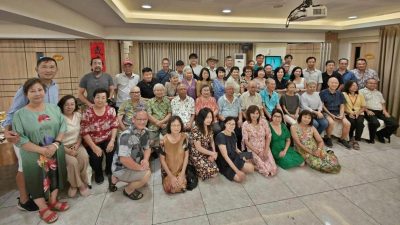By Kuik Cheng Kang, Sin Chew Daily
Since I joined the press in 1985, I've been working in this same profession for a full 35 years. Looking back, the web news ecosystem we have today is very different from the journalistic beliefs I have always subscribed to.
Last week I asked the website to delete a piece of news on a female influencer masturbating at an Ikea store in China, simply because I couldn't convince my own conscience to publish it.
I joined this line with the belief the media industry was a noble institution that could help a lot of people out there. A reporter could make our society better with the pen in his or her hand, to provide a definite sense of direction and care for people living in a hostile environment or momentarily lost in their lives.
I remember there was this day not long after I joined the press, my former boss sent me to Jinjang to interview a middle-age man with a suicidal intent. I sped on my motorcycle to the scene to find out why he had this intention of taking his own life. In the end, I managed to talk him into reversing the decision, and put that down into a piece of news after going back to my office.
The striking headline on Shin Min Daily the following morning: Reporter rushes to scene to safe life!
The news clipping is still safely kept in my house to this day, and all the little events that took place throughout the interview have since shaped my attitude towards life and work. It never crossed my mind that a rookie reporter could have such an enormous power to change the society!
What a sorrow for the industry If the media no longer has the social significance of its raison d'être at heart, and bows to the distorted web ecosystem of today, trying to boost viewership by publishing indecent, sensational and explicit content.
On the above incident of a Chinese social media influencer shamelessly masturbating in public, what I felt was that her action was morally not right and she was just attempting to get public attention. As media we are not obliged to help promote such perverted demeanor.
Prior to this, there was this incident of an old man lying dead at a gas station.
A media report claimed that the old man was suspected to have died of coronavirus after the video of him went viral on social media. When I asked my colleagues about this, I was told they had not come across this video clip anywhere on the social media, and the police had confirmed the man had died a sudden death and had stopped investigating the case.
To my colleagues in the print media, this was just a minor piece of news that would at best occupy an insignificant corner of the local news section even if got to print eventually. None of my colleagues saw the arguably "viral" video anywhere and would therefore not link the incident to suspected coronavirus death.
A truth-seeking reporter shall never subject himself to hearsay, less so wilfully misguide his readers through his unsubstantiated imagination and then innocently deny it. Such untruthful reporting contravenes the noble journalistic beliefs we have been upholding, and will easily sink the society into a state of confusion.
While the media can firmly adhere to the principles of good reporting and truthfulness, it may also unwittingly help generate and propagate fake news. The option lies with the individual's conscience.
There was this incident that took place on May 5: the Perlis menteri besar announced that all individuals entering the state from a COVID-19 red zone would have to undergo mandatory quarantine. Right then some of the media reported that "anyone entering Perlis would be quarantined for 14 days".
When our reporter was asked why her news was different from what had been reported elsewhere, she replied, "I asked in the press conference whether the quarantine was for people coming from red or yellow zone, but the MB didn't give a forthright answer. The other media could have misquoted him."
The reporter later managed to contact the MB and confirmed that the news carried by Bernama was wrong. The national news agency subsequently withdrew the news.
Reporters today are of very different qualities, but we have full confidence in the competency of our young Perlis reporter.
Unfortunately media companies are increasingly inclined to publishing news without making an effort to verify its authenticity. Verifying a piece of news is what all media watchmen need to do on a day-to-day basis.
To rush the news out to the market before the competitors do, we often fall into the trap of helping to promote the spread of misinformation, misleading the public and causing widespread panic in the society in so doing.
I have to admit that we in Sin Chew Daily did commit such mistakes by instantaneous oversight in pursuit of speed, even though we later clarified, apologized and published the corrections.
In this age of information overload, everyone is blindly going after the hit numbers, and coincidentally contents commanding high hit traffic are trivial stuffs impregnated with violent, explicit, gossipy and entertaining elements.
I always remind my colleagues that we have to be close to the web ecosystem but that does not mean we should forget that the institution we are serving is Sin Chew Daily, an orthodox media organization that prioritizes social obligations and inspires the nation. We are not ad hoc content farm manufacturers.
News that we handle must be established upon facts acquired through reliable official sources. If we can't verify a piece of news, I would rather we leave it out.
We must not take news reporting for granted, nor generate content as per the liking of web users. We will end up nowhere if we think we can be king of the Internet world by creating this kind of news, completely shattering the reputation and credibility Sin Chew Daily has built up over the past 91 years.
I stand firmly by the belief that the media should only produce good quality news. As such, we have zeroed in on specific groups of readers through our dedicated columns "Warm Power", "Seeking Truth" and "Easily" in building up our niche audience base. The future of a media organization is bleak without a group of faithful followers.
Against the backdrop of an increasingly chaotic society, we should more than ever inspect all public discussions on certain social issues and analyze how things have come into place. The media is obliged to constantly position itself as a unique and sober voice speaking up for the community, saying things others dread to say or unwilling to say. We must lead the social consensus, not be led by the nose by popular sentiments and likings.
Luring the attention of readers with sexually evocative headlines and content will only earn us short-term hits or spike the day's viewership, but in the long run will hurt our credibility. It will not help us build a loyal reader base but will cost us quality readers we have acquired through the years.
In the aforementioned incident of an old man lying dead at the gas station, if Sin Chew Daily danced to the tune of ignorant web users and enticed them to associate his death with the coronavirus, what if it is later proven otherwise? We would have inflicted unnecessary agony to the victim's family.
The distance between us and evil is just as narrow as a thought away.
This is a line of defense we must fiercely guard. As media practitioners, we should not just be answerable to our readers, but the society at large, too.

ADVERTISEMENT
ADVERTISEMENT


































